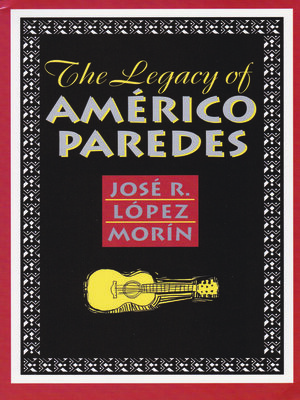The Legacy of Américo Paredes
ebook ∣ Rio Grande/Río Bravo: Borderlands Culture and Traditions
By José R. López Morín

Sign up to save your library
With an OverDrive account, you can save your favorite libraries for at-a-glance information about availability. Find out more about OverDrive accounts.
Find this title in Libby, the library reading app by OverDrive.



Search for a digital library with this title
Title found at these libraries:
| Library Name | Distance |
|---|---|
| Loading... |
Américo Paredes (1915–99) is one of the seminal figures in Mexican American studies. With this first book-length biography of Paredes, author José R. López Morín offers fresh insight into the life and work of this influential scholar, as well as the close relationship between his experience and his thought.
Morín shows how Mexican literary traditions—particularly the performance contexts of oral "literature"—shaped Paredes's understanding of his people and his critique of Anglo scholars' portrayal of Mexican American history, character, and cultural expressions.
Although he surveys all of Paredes's work, Morín focuses most heavily on his masterpiece, With a Pistol in His Hand. It is in this book that Morín sees Paredes's innovative interdisciplinary approach most effectively expressed. Dealing as he did with a people at the intersection of cultures, Paredes considered the intersection of disciplines a necessary locus for clear understanding. Morín traces the evolution of Paredes's thought and his battles to create a legitimate home for his approach at the University of Texas.
A voice for Chicano consciousness in the late 1960s and thereafter, Paredes championed Mexican American studies and encouraged a generation of scholars to consider this culture a legitimate topic for research. Urging the application of context to the understanding of oral texts, he challenged then-current methods of folklore and anthropological study in general.
Paredes's name will continue to resonate in Mexican American studies, American folklore, and Anthropology, and his work will continue to be studied. Américo Paredes: Folklorist of the Border makes a strong case for the lasting importance of Paredes's work, especially for a new generation of scholars.
Morín shows how Mexican literary traditions—particularly the performance contexts of oral "literature"—shaped Paredes's understanding of his people and his critique of Anglo scholars' portrayal of Mexican American history, character, and cultural expressions.
Although he surveys all of Paredes's work, Morín focuses most heavily on his masterpiece, With a Pistol in His Hand. It is in this book that Morín sees Paredes's innovative interdisciplinary approach most effectively expressed. Dealing as he did with a people at the intersection of cultures, Paredes considered the intersection of disciplines a necessary locus for clear understanding. Morín traces the evolution of Paredes's thought and his battles to create a legitimate home for his approach at the University of Texas.
A voice for Chicano consciousness in the late 1960s and thereafter, Paredes championed Mexican American studies and encouraged a generation of scholars to consider this culture a legitimate topic for research. Urging the application of context to the understanding of oral texts, he challenged then-current methods of folklore and anthropological study in general.
Paredes's name will continue to resonate in Mexican American studies, American folklore, and Anthropology, and his work will continue to be studied. Américo Paredes: Folklorist of the Border makes a strong case for the lasting importance of Paredes's work, especially for a new generation of scholars.







